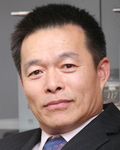|
 |
|
MEDIA DEBUT: Members of the Standing Committee of the Political Bureau of the 18th Central Committee of the Communist Party of China meet the press after their election on November 15, 2012 (XIE HUANCHI) |

The article is an edited excerpt from China's Collective Leadership System, a new book authored by Hu Angang, Director of Tsinghua University's Center for China Studies. Hu says that the collective leadership system, created by China, is a unique, politically superior, efficient and also democratic decision-making system. The Renmin University of China Press published the book in July. Springer will be publishing the English translation.
After the founding of the People's Republic of China in October 1949, the Communist Party of China (CPC), the world's largest ruling party, created a unique collective leadership system with Chinese characteristics. The system has been formulated, developed and improved through a long process of innovation, learning as well as trials and errors.
The system means that the collective leading body, the multi-member Standing Committee of the Political Bureau of the CPC Central Committee, exercises state powers and collectively oversees Party and government affairs.
Members of the Standing Committee of the Political Bureau of the CPC Central Committee also respectively represent different leading organs of the Party and the state. They have clear division of work while they also coordinate with each other.
The essential feature of the system is collectiveness. Decisions are made based on collective rather than individual wisdom.
The CPC and China's government departments practice democratic centralism, which is the fundamental characteristic of the collective leadership system. It fits China's basic national conditions and cultural background very well. Of course, there should be continuous improvement.
Coordination
Members of the Standing Committee of the Political Bureau of the CPC Central Committee respectively represent different organizations and are in charge of different work areas, while they come together to make any significant decisions.
For instance, the standing committees from the Political Bureau at the 16th (2002-07) and 17th (2007-12) CPC Central Committee each had nine members. The general secretary of the CPC Central Committee also concurrently served as the head of state. Other members included heads of the government (State Council), national legislation (National People's Congress), national advisory body (National Committee of the Chinese People's Political Consultative Conference), as well as people in charge of the Party's organization, publicity and culture, disciplinary inspection, as well as political and legal affairs.
They made significant decisions relating to such important issues as dealing with the international financial crisis and serious natural disasters, as well as the formulation of the 12th Five-Year Program for China's social and economic development between 2011 and 2015, through sharing information, exchanging ideas and coordinating opinions. Information asymmetry was reduced to guarantee correct and highly consistent decisions.
Communication, consultation and coordination are mainly carried out through the following channels: communication and consultation between individual members of the Standing Committee of the Political Bureau of the CPC Central Committee; coordination between organizations represented by these members; information, knowledge and suggestions provided by these organizations' think tanks; and inter-organization as well as intra-organization information sharing.
These organizations also supervise each other. For instance, according to relevant provisions of the Constitution, the State Council is the supreme administrative organ of state power, and it should report to the National People's Congress and accept its supervision.
Power transition
The resolution adopted at the Fourth Plenary Session of the 17th CPC Central Committee in September 2009 said that leadership teams of Party organizations should be optimized so that members can complement each other in terms of age, experience, expertise and personality, which will increase the team's overall synergy and its ability to function efficiently.
Provincial Party chiefs now account for a large part of the candidate pool for central leadership positions.
China is the most populous country in the world. As of the end of 2012, 11 countries had a population exceeding 100 million. If we classify a country with a population of more than 60 million as a big country, then China has at least eight provinces that could count as such in their own right.
The area, population and economic scale of some Chinese provinces are equivalent to those of many countries. Governing such a province is similar to governing a country.
In this test of governance, provincial Party chiefs can accumulate the necessary information, knowledge, experience and ability to oversee operations at a national level.
| 